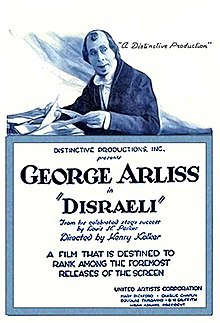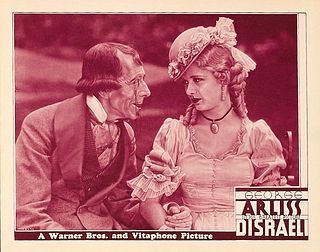
Disraeli is a 1929 American pre-Code historical film directed by Alfred E. Green, released by Warner Bros. Pictures, Inc., and adapted by Julien Josephson (screenplay) and De Leon Anthony (titles) from the 1911 play Disraeli by Louis N. Parker.
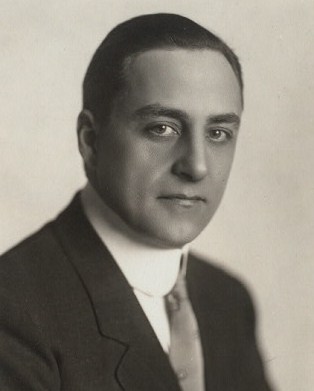
Joseph Henry Kolker was an American stage and film actor and director.

George Arliss was an English actor, author, playwright, and filmmaker who found success in the United States. He was the first British actor to win an Academy Award – which he won for his performance as Victorian-era British prime minister Benjamin Disraeli in Disraeli (1929) – as well as the earliest-born actor of any category to win the honour. He specialized in successful biopics, such as Disraeli, Voltaire (1933), and Cardinal Richelieu (1935), as well as light comedies, which included The Millionaire (1931) and A Successful Calamity (1932).

Thank You is a lost 1925 American comedy film directed by John Ford. This film is based on a 1921 Broadway play, Thank You, by Winchell Smith and Tom Cushing.
Benjamin Disraeli (1804–1881) was a British politician and writer who twice served as Prime Minister of the United Kingdom.

Margaret Dale was an American stage and film actress. She performed on Broadway for over fifty years and occasionally did films in the 1920s. She appeared in a large number of Broadway hits over the course of her years as an actress.

Lights of Old Broadway is a 1925 American silent drama film directed by Monta Bell, produced by William Randolph Hearst's Cosmopolitan Productions, and released by Metro-Goldwyn-Mayer. The film stars Marion Davies in a dual role and Conrad Nagel, and is an adaptation of the play The Merry Wives of Gotham by Laurence Eyre (USA). The film has color sequences using tinting, Technicolor, and the Handschiegl color process.
To-Day is a 1917 silent film drama directed by Ralph Ince, who is also credited as the film's writer, and starring Florence Reed. A story about prostitution, this film is based on a 1913 stage play Today by George Broadhurst and Abraham S. Schomer and starred Emily Stevens which ran for an astounding 280 performances in eight months time. Actors Gus Weinburg and Alice Gale are the only actors in the film that appeared in the play. It is considered to be a lost film.

The Passing of the Third Floor Back is a 1918 British/American silent allegorical film based on the 1908 play The Passing of the Third Floor Back by Jerome K. Jerome and directed by Herbert Brenon. The star of the film is Sir Johnston Forbes-Robertson, a legendary Shakespearean actor, who starred in the 1909 Broadway presentation of the play and its 1913 revival. Forbes-Robertson had been knighted by King George V in 1913 and had retired from acting in theatre that same year. In his retirement Forbes-Robertson had only dabbled in film acting making a 1913 film version of Hamlet, the most famous role he had played on the stage. Filmed in 1916, it was released in 1918.

Wildfire is a 1925 American silent drama film directed by T. Hayes Hunter. It was produced by Distinctive Productions, a company founded by George Arliss, and distributed by the Vitagraph Company of America. The film stars Aileen Pringle.
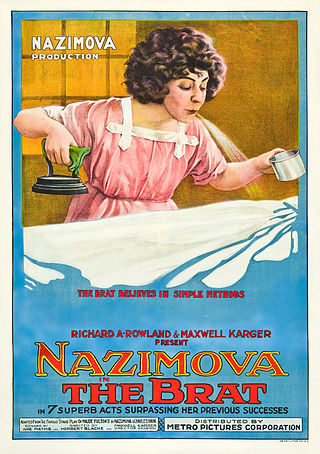
The Brat is a 1919 American silent drama film produced by and starring Alla Nazimova and directed by Herbert Blache. The film was released by Metro Pictures, who had Nazimova under contract, and is based on Maude Fulton's 1917 Broadway play in which she starred. It was remade as the 1931 film The Brat with Sally O'Neil in the lead role. The film is lost.

Second Youth is a 1924 American silent romantic comedy film produced by Distinctive Pictures and distributed through Goldwyn Pictures. The film is one of the few and rare silent appearances of Broadway husband and wife team Alfred Lunt and Lynn Fontanne.

Tiger Rose is a 1923 American silent romantic adventure film produced and distributed by the Warner Brothers. It is based on Willard Mack's 1917 Broadway play starring Lenore Ulric. Ulric reprises her role in this silent film version. The story was later filmed as again in 1929 as Tiger Rose by George Fitzmaurice. The SilentEra database lists this film as surviving.
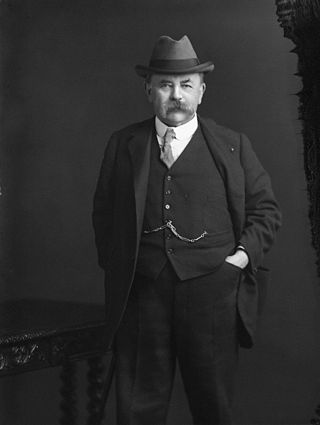
Louis Napoleon Parker was an English dramatist, composer and translator. Parker wrote many plays, developing a reputation for historical works. His 1911 play Disraeli is one of his best known, written as a vehicle for the actor George Arliss who later won an Academy Award for his performance in the 1929 film adaptation, itself based on his earlier 1921 silent film version.

Our Mrs. McChesney is a lost 1918 American silent comedy-drama film produced and distributed by Metro Pictures, directed by Ralph Ince, and based on the 1915 play by Edna Ferber and George V. Hobart starring Ethel Barrymore.
Disraeli is a 1916 British silent biographical film directed by Charles Calvert and Percy Nash and starring Dennis Eadie, Mary Jerrold and Cyril Raymond. The film was based on the 1911 play Disraeli by Louis N. Parker, which was adapted twice more, as a 1921 silent version and most famously in 1929, as an early sound film. It was made at Ealing Studios.

Disraeli is a biographical play by the British writer Louis N. Parker, which was first staged in 1911. The play was commissioned by the actor George Arliss who saw a portrayal of the Victorian British statesman Benjamin Disraeli as an ideal vehicle for his stage career. It was written in London during 1910. Parker suffered from writer's block at one point and received some assistance from Arliss. Parker included a subplot lifted from the 1839 play Richelieu by Edward Bulwer-Lytton which was later the subject of some controversy. He added a number of fictitious characters to add excitement and drama to the story. The real role of Lionel de Rothschild in the purchase was changed to that of the fictional banker Meyers. The play premièred at Wallack's Theatre in New York City on 18 September 1911.

Rich Man, Poor Man is a lost 1918 American silent romantic drama film starring Marguerite Clark and directed by J. Searle Dawley. It is based on a 1916 Broadway play by George Broadhurst. It was produced by Famous Players–Lasky and distributed by Paramount Pictures.

(for a 1929 early talkie remake starring Edward G. Robinson and Claudette Colbert see --The Hole in the Wall.)
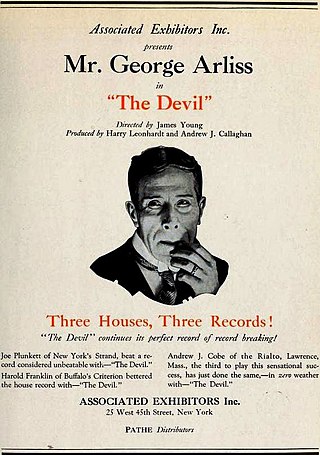
The Devil is a surviving 1921 silent drama film directed by James Young and starring stage actor George Arliss in a film version of his 1908 Broadway success of Ferenc Molnár's play, The Devil [1]. Long thought to be a lost film, a print was discovered in the 1990s and restored by the Library of Congress.
